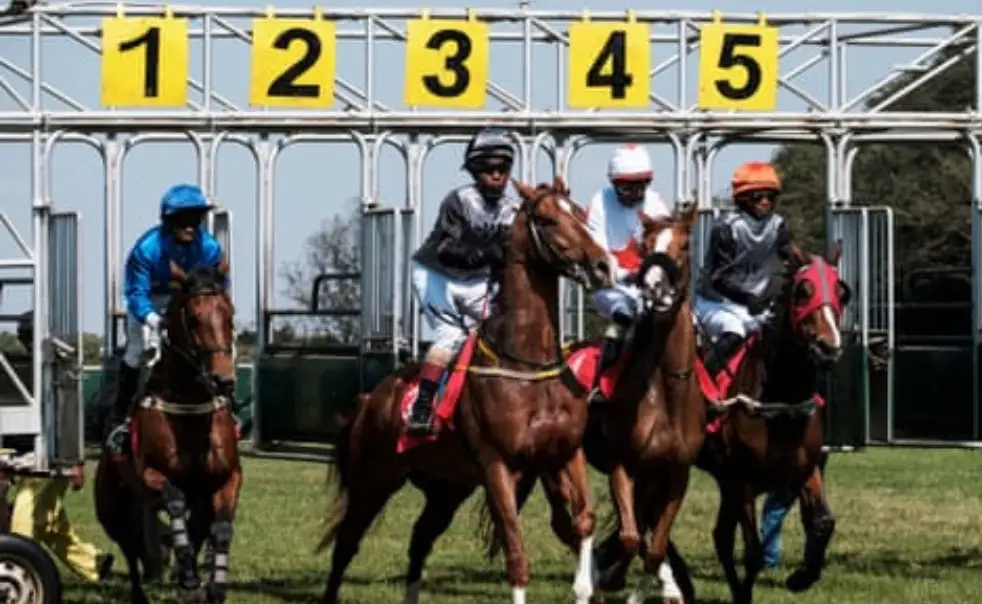Black Kenyans Redefine Horse Racing in Nairobi

Wendz
Sep 19th 2025
Likes
Share:
Ngong Racecourse in Nairobi was packed with fans who cheered loudly as the horses took the final bend of the fifth race of the Day of Champions, the end of the racing season meeting. Cheers of “Bedford! Bedford! Bedford!” filled the grandstand as the horse, guided by jockey Michael Fundi, surged ahead on the home stretch to claim victory.
For Fundi, the win was more than a single triumph. After realizing he would win the final race of the season in Nairobi, the 20-year-old jockey, who stayed on top of the standings all season, not only demonstrated that he is the champion of the season but also confirmed his status in Nairobi. He is the ten-year-old youngest of the last ten years, a feat that heralds a new era of horse racing in Kenya.
“This is one of those feelings you can’t put in words,” Fundi said, smiling in the parade ring as he received his award.
This person’s sporting achievement is a clear illustration of the small but significant changes that can still be observed in a game that is generally considered to be heavily influenced by the white Kenyan community in Nairobi. Besides being at the races, athletes who are from Kenya are also very conspicuous in the riding and even at the management level of the sport, thus breaking the old stereotypes that were obstacles.
Muturi Mutuota, a director at the Jockey Club of Kenya, remembers a different time. “Growing up, that was a sport for other people, not me,” he recalled. As a child in the 1980s and 1990s, he occasionally visited the track with his parents, but few black Kenyans were visible in key roles. Today, the picture is different. At this year’s Day of Champions, three of the seven trainers were black, along with ten of the thirteen jockeys competing.
Fundi’s own path reflects the changing opportunities. He was brought up in Nairobi by his grandparents and went to Ngong Racecourse for the first time when he was 13 after his grandfather started taking him to the weekend races. To help him develop his interest, his grandfather introduced him to Steve Njuguna, a former champion jockey who works as a trainer. Njuguna agreed to teach the teenager the skills of racing.
Before he could ride competitively, Fundi worked as a groom, learning the discipline and care required to manage racehorses in Nairobi. He began racing at 16, finishing last in his first attempt but claiming his first win by his fifth outing. Now in his fifth season, Fundi has achieved his best results yet, proving himself as one of the country’s top jockeys.
The growth in black participation has raised the level of competition among riders and trainers. Fundi acknowledges that the wider pool of talent pushes everyone to improve. “You can feel it in every race,” he said.
Trainers are also gaining ground. Joe Karari, 41, is among those making an impact in Nairobi. His horses raced at a number of competitions during the Day of Champions, which was a clear signal of the greater involvement of black professionals in the equestrian world, an area that has historically been dominated by a few families and expats.
Some executives in the equine industry agree that the change was brought about by the Jockey Club and private owners’ consistent work towards making the sport more inclusive. The establishment of training programs, provision of mentorship, and outreach at the grassroots level have all contributed to bringing more young riders into the sport. The escalating number of black owners and trainers, in turn, has opened up the sport for many to get jobs and advance their careers.
“The Day of Champions” brought together families, experienced punters, and new followers, melding the crowd as they placed their bets and cheered their favorites. Horse racing in Nairobi continues to be a big part of the weekend social circuit in the city, although it has faced many difficulties due to a lack of money and the high cost of the horses. Many people think that the rising variety at the racecourse is injecting new life into the event and making it more accessible, which used to be regarded as an exclusive club.
Journey from being a curious teenager to a champion jockey is the case that he uses to demonstrate the way for the new riders. He remembers his grandfather as the one who pushed him to follow the racing path and Njuguna as the one who gave him the necessary training. The success of Fundi and that of other black trainers and jockeys is slowly but surely changing the perception of Kenyan horse racing.
As the season closes, the achievements of Fundi and his peers signal a future where talent and dedication, rather than history or background, define the sport. Their progress is drawing new attention to a tradition that continues to evolve, with each race offering fresh proof that the face of Kenyan horse racing is changing.
